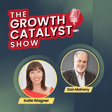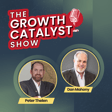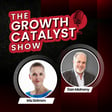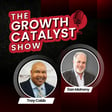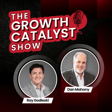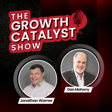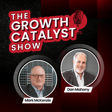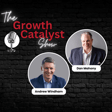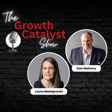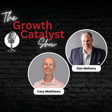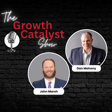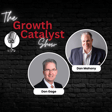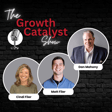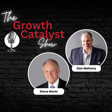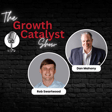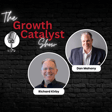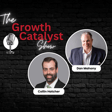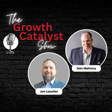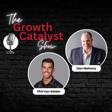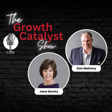Become a Creator today!Start creating today - Share your story with the world!
Start for free
00:00:00
00:00:01

Unlocking Growth through Sales Storytelling: A Conversation with Stephanie Gustafson
Unlock the secrets to small business growth with Stephanie Gustafson, the mastermind behind Digital Rev Gen. Learn how she leverages her expertise in sales storytelling, email campaigns, and website copy to boost small businesses' revenue and transform their online presence.
Transcript
Introduction to the Growth Catalyst Show
00:00:00
Speaker
Welcome to The Growth Catalyst Show, where we believe that growth can come in many forms, professional, personal, company, sales, you name it. I'm your host, Dan Mahoney, founder of Transcendent Sales Solutions and a guide to a world of growth possibilities. I've spent my career empowering companies and their people with strategies that accelerate growth.
00:00:18
Speaker
I'm here to bring you stories of these business leaders and their trusted advisors to gain insights into their journeys and learn how they fueled their own growth. Just maybe their journey could become part of your own growth story. Are you ready? Let's grow.
00:00:34
Speaker
Welcome to the next edition of the Growth Catalyst Show. I'm your host, Dan Mahoney, and I have my next guest here.
Introducing Stephanie Gustafson
00:00:39
Speaker
Stephanie Gustafson is the founder of Digital RevGen, which helps small business owners create clear and concise sales and marketing materials to grow their businesses. As a sales and marketing veteran, she is
00:00:52
Speaker
been selling across digital platforms to Fortune 500 companies globally for over 15 years. Stephanie has successfully worked with top companies that include Amazon, Google, Accenture, and McKinsey & Company. Stephanie, welcome to The Growth Guidance Show. Thanks so much for having me, Dan. Good to be here.
00:01:10
Speaker
It's fun to have you today. I had so many questions and I'm so glad to have you today. You know, first I want to talk a little bit about your
Stephanie's Early Career and Realizations
00:01:18
Speaker
background. So I know you're from California. Yes. And you had a degree in marketing. So you went to California State University. That's in Long Beach, isn't it?
00:01:29
Speaker
Well, there are several Cal State campuses and like most of the states, there's the state public school systems. And so in California, you have the University of California system, UCLA, Berkeley, San Diego, Santa Barbara. And then there's the Cal State system. I went to Cal State Northridge. There is San Diego State University, Cal State Sacramento. Cal State Northridge is one of the largest, if not the largest of the system. San Diego's right up there and marketing business is their strongest program.
00:01:59
Speaker
So what was the plan when you're in college as you were going through your marketing degree? Mine was the same thing, same path, and I knew I was going to end up going into sales. Oh, you did? That's amazing. I did, yeah. Yeah.
00:02:13
Speaker
I don't know. I think I, you know, at one point I had aspirations to be CEO of a public corporation. And then I started working for large public corporations and realized how bureaucratic they are. That squash that. Cause my husband tells me all the time, I'm too honest. Um, and for years I thought, I'm like, that's not a bad thing. And then in time I learned honesty needs to be, you know, you need to be measured in what you say. And so,
00:02:42
Speaker
Being a CEO wasn't necessarily my fate. I wasn't nearly as political as I needed to be, probably. Oh my God, I tell you, you say that and I laugh because I had that same dream. I wanted to fly around with a private jet and I wanted to have all that. But then you think about it all now and it's like, who wants all that? Living in a fishbowl. I know, right? And on your emails 24 seven and all the scrutiny now, that's okay.
00:03:06
Speaker
Yeah, absolutely. So you got into hospitality and started the hospitality industry. So what was the path that led you there?
Career Transitions and Industry Insights
00:03:14
Speaker
Well, actually my first job that I had before I even graduated college was I was a meeting planner for the electric utility and power industry. I know.
00:03:26
Speaker
Incredibly fascinating for a recent college grad, but it was actually it was a great company It was a great background and um, I did get to travel a lot and go to the conferences we plan and funny story we would What we would do was we would research topics create our own programs write the content write the outlines recruit our own speakers
00:03:49
Speaker
Market the programs and then we made revenue by people paying to attend our conferences and from sponsorships So we had a pool of speakers that we regularly tapped into and in the early days And this was back in the mid mid 90s of one of our top group of speakers were from Enron Jeffrey skilling
00:04:11
Speaker
Um, yeah, so that those group of of gentlemen, so those were some of the types of speakers we were using at our conferences um, you know It was a it was a different time, but the great group It was a very good job and then from there because I you know wasn't necessarily passionate about the electric utility and power industry I transitioned into the hotel space started out in catering and quickly moved into the sales
00:04:38
Speaker
side of things and became a director of sales and marketing. I worked for most of the large hotel companies across the globe. Marriott, Starwood back in the day. I actually started with Starwood very early on when Barry Sternlicht had first started the company as a small REIT based in Arizona.
00:04:59
Speaker
and was with Starwood when he created the W Hotel brand. So I really got to see the evolution of what's now become a really well-known hotel brand and all the things he did to differentiate it in the space and really kind of take that boutique hotel style and mass produce it. So that was a wonderful learning ground of the evolution and building of a brand.
00:05:25
Speaker
And I love that they're, as a Marriott guy, that they finally merge with Marriott. Starwood, I just love it. Yeah. And then from there, I went to Hilton, worked for Hilton corporate on a brand team. And then I was the director of performance metrics and competitive intelligence. So I was responsible for all of Hilton's data analytics, the data that was used to help
00:05:48
Speaker
brand managers determine where to develop properties, the data that was used by our CFO to report out to the street, and then all of the CI for the company. And then I came to Atlanta here with IHG and I worked on their global sales strategy team.
Navigating Industry Challenges
00:06:05
Speaker
So all the years, I think, you know, probably 16, 17 years in the hotel industry, what are some things you learned along the way that sets you up to be an entrepreneur?
00:06:15
Speaker
The hotel industry is a very dynamic space. I've noticed I've been through several ups and downs. 9-11, of course, had a huge impact on the hospitality industry.
00:06:30
Speaker
economic downturn of 2008. And then, of course, the most recent COVID, which destroyed the hospitality industry for a while, of course, it's rebounded. But that's what I've learned, is you need to be prepared for those downturns, be able to pivot quickly, really kind of think of different opportunities. You can't be doing things the way you used to, and that everything eventually comes back around. You just need to stay your course.
00:06:58
Speaker
So if we fast forward now to 2020, again, your pivot is interesting. My pivot getting out of the corporate world was starting sales consulting. Yours was starting digital rev
Founding Digital RevGen and Embracing Digital Sales
00:07:11
Speaker
jet. Tell me how that came about as far as doing what you were doing to what you're doing now.
00:07:17
Speaker
Yeah. So when I was with my latest role with IHG on our solution design team, IHG, we were working with our large global travel accounts. So like you mentioned in your introduction, Google, Accenture, Accenture, McKinsey, these were companies where, you know, their employees are traveling all the time. And so the hope the travel managers at these companies are negotiating rates.
00:07:42
Speaker
so their travelers can stay at set hotels. And what our role was was to put together customized pricing agreements and create the story to convince these travel managers why they should be shifting from our competitors into our properties. So it was a mix between
00:08:01
Speaker
data analysis? What was the revenue opportunity? How could we save you money? But also the sales story, right? What was the opportunity for you? What were your KPIs, your key performance indicators you were being measured on? How could this travel program help support you in your role?
00:08:18
Speaker
And so we had to be, you know, with every company we sold to and presented to, one, we were doing it across digital platforms because I could be presenting to China in the morning or actually Germany in the morning and China in the evening. And so we had to be able to craft a compelling story that could be done over
00:08:41
Speaker
Zoom or WebEx because we didn't have the opportunity to meet with clients face to face and have that personal connection that so many selling salespeople use to connect with their clients. And so we became trained in the Challenger sales framework.
00:08:58
Speaker
And that really took our clients through their sales story. And we really had it down so well that by the time we finished our presentation, we were about at a 90% verbal acceptance rate because it made so much sense the way we had positioned the messaging. So when the pandemic hit, I started to think of all of the sales people I'd worked with over the course of my career. And what made them
The Power of Email Marketing and Storytelling
00:09:22
Speaker
so great was how they connected with their clients face to face. And now they were being put
00:09:27
Speaker
on virtual platforms being forced to create these powerpoint presentations that did the storytelling for them and i knew how many of them would struggle and i had spent so many and so much time the past six seven eight years building out this kind of presentations that i took it as an opportunity to help.
00:09:47
Speaker
small businesses create their sales story, right? Whether it's on their websites or their sales presentations, emails, emails are critical. I'm doing a lot of talking right now in my own content about the importance of email. It's got a highest return on investment of any of the marketing out there. But you need to be able to effectively tell your story in a specific series of conversations.
00:10:16
Speaker
Well, and it's funny, you will jump to the email. I did get an email from you yesterday and it said, do your emails get ignored? And I actually opened it because I said, yes, they do. And I was surprised as I was reading it. It's 3600% ROI on email. So, you know, if you talk about that and I was like, wow, like, okay, I'm doing some emailing. What am I doing wrong?
00:10:43
Speaker
I mean, is anybody reading it? Because I don't get a lot of replies on emails, and I know I'm not alone with that. So where's the disconnect?
00:10:54
Speaker
Well, the first thing is consistency, which I think a lot of us struggle because I kind of equate it to going on a diet and trying to lose weight, right? You're eating, you can be very vigilant about what you're eating for two, three, four days, and then you get on the scale and say, oh, I haven't lost anything, forget it, I'm done. And I think so much of our marketing efforts, whether it's email or social media, whatever, creating videos, podcasting, when you don't get
00:11:24
Speaker
you
00:11:24
Speaker
a response from your audience. You don't have some sort of feedback that you're being heard or some sort of validation. It's a natural tendency to give up. So that's the first thing. Stay the course, be consistent. But if you're not hearing from your audience, then it's a question, am I asking the right questions in terms of my call to action? What is my call to action? Is it clear? Is it being repeated multiple times throughout the email or the social media post or on your website? Whatever it may be.
00:11:54
Speaker
If we don't tell our audiences what we want them to do, your call to action, they're not going to do anything. And it needs to be repeated multiple times because if you just save it for the end of an email, you're assuming everybody's going to get to the bottom of that email. And that's a false assumption. Conversely, if you put it just at the top, there are some people who immediately just go to the bottom, which is why the PS is so important.
00:12:18
Speaker
So you need to do it multiple times and it really comes down to playing with it, trying different things. I was just on the phone with a colleague earlier today and we really talked about the need to test and measure. There is a reason why A-B testing is recommended so often is you constantly need to be testing what works and frankly, what works today may not work three, four months down the road. Because of the changing because things could change quickly, yeah.
00:12:48
Speaker
I know you focus on email and you also focus on website content. That's another thing I'd like to talk about because when I go to a lot of websites, I see a lot of here's what we do versus how we help people. Is that a disconnect or is that one of many or what are you seeing where people aren't getting the return on their website or getting the engagement that they're looking for?
00:13:16
Speaker
Let's take a moment for a quick word from our sponsor.
00:13:40
Speaker
They take a hands-on, results-oriented approach to solving sales challenges. Visit TranscendenceSales.com to learn more and subscribe to the biweekly Growth Catalyst newsletter for insightful growth strategies. Transcendence Sales Solutions, empowering businesses to reach new heights. And now, back to the show.
00:13:58
Speaker
Yeah, so I'm going to draw a parallel back to my time in the hospitality industry. So back in the day, we used to market our hotels by how many rooms we had. We were recently renovated, blah, blah, blah. All we did was talk about ourselves and our properties.
00:14:17
Speaker
One of the things I learned in the Challenger selling was to put your customer at the center of the conversation. Your customer has a problem and they're looking for a solution. When you build your sales messaging, you really need to focus on
00:14:36
Speaker
your customer and the problems they're experiencing. When I left IHG and started my own business, I was introduced nearly four years ago by another marketer based here in Atlanta, actually. She's wonderful.
00:14:56
Speaker
to something called the story brand framework by Donald Miller, building a story brand. And she told me when I was talking with her about Challenger sales, you need to get this book, it will resonate with you. And so I ordered it on Amazon, received it and
00:15:12
Speaker
consumed it probably within two, three days max and couldn't believe one, how similar it was to the Challenger sales framework, but the story brand framework is from the marketing side. And it really is all based on your ideal customer. They have a problem. They are coming to you because they are looking for a solution to their problem. One of the things Donald Miller always says, people don't buy products or services, they're buying solutions to their problems.
00:15:38
Speaker
And one of the biggest mistakes businesses make on their website is they feel the compelling need because you've gone to their website that they need to talk about themselves to convince you why you should use them. But what's the critical missing piece is
00:15:55
Speaker
Your ideal customer wants to talk about themselves first. We are wired to, our favorite topic is ourselves. So give your ideal customer what they want and give them the opportunity to talk about them, talk about themselves, make sure you demonstrate you understand who they are. But more importantly, they feel a connection to a business who understands their problems.
00:16:19
Speaker
understands it so well if they almost feel, are they in my head? Have you ever had that where you feel like you see marketing or some sort of messaging and you're like, they know exactly how I feel. They're talking to me. Yeah, that is well done. And only after you've been very clear on who's my customer, what are the problems they're struggling with?
00:16:40
Speaker
then they're willing to listen to you. That's why the framework, whether it's challenger sales or story brand, you have to, your sales story has to follow a particular series of steps. And when it comes to a website, you may have freedom on a lot of your pages, but your homepage, it is critical that it follows a particular cadence and it always needs to be speaking to your ideal client and their biggest problems.
Utilizing the StoryBrand Framework and Challenger Sales
00:17:08
Speaker
So with the StoryBrand, I know you're a certified guide for StoryBrand. I know there's a StoryBrand script I've worked with a little bit before. Can you use that script? Is there a script for email and for a website, or is it more just for a website?
00:17:24
Speaker
Well, the script, the story brand script, and actually Donald Miller is so generous with his materials. So if you visit the website and it might even be buildingastorybrand.com, there's a lot of materials you can download. And he does have a blueprint for how your homepage should be laid out. He has a blueprint for creating, you know, how to create a lead magnet and then that
00:17:51
Speaker
email sequence where you take a cold lead and warm it up. He has a five-part email where email one should talk about this and email two should talk about that. It's difficult for people to implement themselves, which is why guides like I exist because it's
00:18:11
Speaker
I can listen to a client of mine and within 30, 45 minutes really begin to craft their messaging for them. But when it comes to doing it for ourselves, it's really challenging because we know everything about our own business. We know every little detail and we feel compelled to talk about it. And so we get too deep in the weeds and so granular
00:18:35
Speaker
Customers don't care about that. They just want to know, do you understand my problem and can you solve it? I don't need to know how you solve it, or at least not right now. I'm not ready to hear that. Just tell me you can and let me read success stories, social proofing from past clients that validates what you're saying. That's a critical piece to a lot of people miss.
00:18:57
Speaker
Yeah. And I think with websites, sometimes I think people don't set the right expectations internally because they expect that we're going to invest this website and once we turn it on, it's going to solve our problems. But it really doesn't. And I think one thing I wanted to ask you about is the lead magnets. Because lead magnets
00:19:20
Speaker
I find that sometimes they're hit or miss. There's so much information out there. It's a call to action. But, you know, how do you possibly place a lead magnet where it's going to get somebody's attention? I mean, or is that too broad of a question? No, no. So again, that's something you really have to test and measure. So what a lead magnet is for anybody who might not might not be familiar with the term because they can be called all sorts of different things. But if you go to a product based
00:19:50
Speaker
Businesses website it is some sort of pop-up that comes up after you've been on the website, you know Maybe 10 15 30 seconds that is offering you a discount in exchange for your email address for a service based business for example, you're a In your space. It might be if you're you know, if you're talking about how businesses can generate more leads
00:20:16
Speaker
You may create a lead magnet that is titled Top 5 Tips to Generate More Leads for Your Business Quickly. That's something that's the biggest problem your ideal customer is struggling with. So you create a lead magnet. It's like a four to seven page document usually.
00:20:34
Speaker
You can design them on canvas, save it as a PDF. You put a pop-up on your website. When website visitors are on your page, they'll get asked, do you want to download this information in exchange for an email address?
00:20:50
Speaker
because the ultimate goal is to bring them, get their email address, you can start warming them up, bringing them into your sales funnel. And then, of course, you're promoting it on podcasts. You've got a great platform right here, blog posts, social media, LinkedIn. Anytime you're engaging with your ideal customer, whether it's in person, online or social, and really, Dan, it's all
Creating Lead Magnets and Establishing Expertise
00:21:15
Speaker
three, right? Or everything. I mean, nothing is the end-all, be-all solution.
00:21:20
Speaker
You need to be talking about it all the time. And the great thing about a lead magnet is it positions you as a subject matter expert. You always want to deliver great, valuable information that after somebody has read it, they're like, gosh, that was really worth my time. That was really helpful. And so now they come back to you in the future or think of you when they have another question.
00:21:42
Speaker
That's great information on lead magazines, clears up a couple of things for me. I want to spend a minute on AI and you know, AI has taken us all by storm. I didn't even know what chat GPT was on New Year's Day last year. And you know, now it's everywhere and all the different tools. You know, how is it affecting the copyright aid and content industry? I mean, I've heard, I hear different things about it that it'll eventually replace it. What's your thoughts
The Role of AI in Content Creation
00:22:12
Speaker
on that?
00:22:12
Speaker
Yeah. It's funny. I had multiple conversations with different people in different spaces yesterday about AI. Look, it's the evolution of anything where, yeah, sure, there'll be certain jobs that will probably go away, but they'll just change into something else. One of the examples I gave yesterday in talking with someone was satellite radio. Remember back in the day,
00:22:36
Speaker
where every city had their own DJs and radio stations, and there was DJs all across the country, and now you have satellite radio where you just have a handful of DJs broadcasting across the country. It changed the industry, but it didn't make the industry go away. Same thing with AI. If you're just straight copywriting,
00:22:58
Speaker
Yeah, you may be at risk. I have a lot more strategy behind the copy I'm creating. I consider myself a digital sales strategist. I am creating copy with the goal of driving sales for you. ChatGPT doesn't necessarily understand the story brand framework. They don't know the sequence of statements.
00:23:19
Speaker
They don't know what order to chat gbt doesn't know what order to say things well I've done a lot of testing of it It knows the story brand framework because it's of course online and it just goes and searches it but it can't replicate it the other thing with chat gbt is
00:23:36
Speaker
I've talked with a lot of marketers about this. The content it creates, I would never, ever, ever post it as it is. It is a great place to go for idea generating and to get you started. Or if you're looking for different ways to say things, but I've never seen content that has come out that is actually usable
00:23:59
Speaker
In its form it's just going to speed things up and I was on the phone with a website developer yesterday she works in she does websites for lawyers and They were doing a site for a client. It came to create the people
00:24:14
Speaker
copy for the website pages and the lawyers were like, no, we'll just use chat GPT. And they said, please don't do it. And they said, no, no, it'll be fine. They went from 15,000 hits a month on their website from SEO searches down to four
00:24:34
Speaker
thousand hits a month when they uploaded that AI copy. The search engines know and they don't like it. So the short takeaway is don't do it. The longer story is it absolutely has benefits. You just need to know how to use it and use it in the right way. But I would never recommend anybody use it as it is.
00:24:59
Speaker
That's good information.
Success Story in Content Strategy and Rebranding
00:25:02
Speaker
Talk about some of the impacts that your work has had with some of your clients with Digital RevGen over the past few years. Maybe a success story you can share. Yeah, so early on, one of my first clients was an event planner here in Atlanta.
00:25:19
Speaker
Um, and we were part of a women's networking group and I was presenting on the story brand framework Um, and she obviously was hit incredibly hard Anybody in the event planning space in the early days of the pandemic was and she was struggling to stay above water and she took it as an opportunity, you know the use of the slow time to rebuild her
00:25:44
Speaker
She's decided I'm gonna change my name rebrand my business start from fresh and see if it'll help.
00:25:51
Speaker
From the time we started working together, doing her website, redoing all the copy, connecting her with a branding specialist, and then doing biweekly blog posts for her, which is very important for SEO and to position yourself as an expert. Great content she was sending out to her subscribers every other week. She went from nearly going under to exceeding $1 million in revenue in a matter of 10 months.
00:26:20
Speaker
So and that's one of the reasons why, you know, back to how we kind of started it is when you work in a large corporation, if you do something really fantastic, there isn't that you don't necessarily have that execute
00:26:37
Speaker
See the results of your work and really feel proud because it's so there's such a lengthy process There's so many iterations. It's the scale of it, right? But working with small business owners you see the impact of your the results of your work quicker and it's you know, I mean I this she was about ready to lose her business and it was so fantastic that myself and the person who did her branding and website we were just
00:27:04
Speaker
We adored her and we're so grateful to help her. Yeah. And that's the thing I love about working with small business and getting out of the corporate world is just the impact you see. And you could see it so much quicker. And sometimes it's just these small tweaks that just make the biggest difference. Absolutely. Absolutely.
00:27:26
Speaker
So last question, if anyone would like to learn more about digital RevGen, what's the best way to connect with you and learn more?
00:27:36
Speaker
Well, I would invite anybody to either connect with me on LinkedIn or to visit my website at digitalrevgen.com. They can schedule a complimentary consultation with me. I, of course, have a lead magnet on my website. Right now, it is the five tips to help get your emails opened, sending emails that your subscribers actually want to read.
00:28:02
Speaker
But I love doing complimentary consultations with people to really figure out where they need help and if I'm the right person. And I'm very direct and straightforward if I am not the right person to help you. I had somebody that is a connection of mine reach out to me at the end of last year. She needed help with her LinkedIn profile and PR releases.
00:28:23
Speaker
not spaces of mine, but being a member of the story brand community. I have a great network of other story brand guides I can tap into, but website copy, lead magnets, emails, email campaigns, and really putting together your sales story. What are you saying to your clients to get them to connect with you? That's where I really like to help small business owners. My ideal client, they've been in business three plus years. They're kind of stagnant in growth.
00:28:53
Speaker
They think it might be what they're saying to their clients. They haven't touched their website in a few years and they're really trying to get to the next level. That's my ideal client.
00:29:03
Speaker
Well, I will tell you, your website is fabulous. The lead baggage you put on opening emails, I downloaded it, it is quality. And you have given such great information today. It gave me an education and I know it did for many others listening to this. Thank you so much for taking some time and appearing on The Growth Catalyst Show today. Thanks for having me, Dan. This was fun and I appreciate your inviting me to join and hopefully everybody finds a little bit of value from this. I know they will for sure. Thank you.
00:29:33
Speaker
And that's a wrap for today's episode of The Growth Catalyst Show. Remember, you can take these stories of growth and make them part of your own journey. Learn from them, draw inspiration, and let them guide your path of growth. I'm your host, Dan Mahoney, and I look forward to our next journey together. If you've enjoyed the show, please subscribe and leave a review. Until next time, keep growing.
